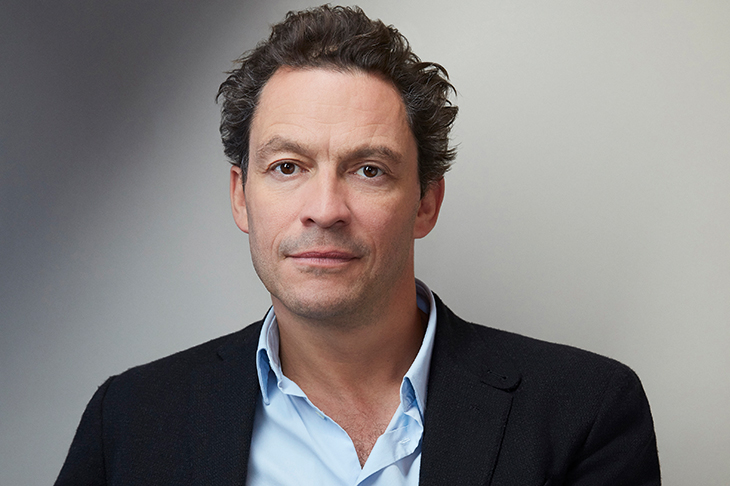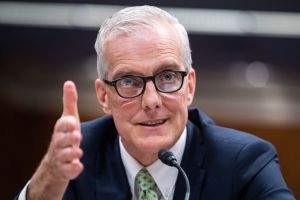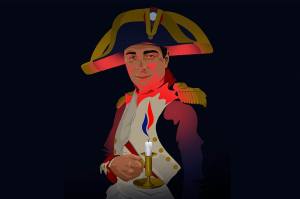Lounging confidently on the sofa of a Soho hotel suite, Dominic West has been beaming at me, but now his handsome smile dissolves into a hurt look.
I have just asked him to explain why he, in common with so many actors, feels the need to voice his political views.
‘I should just pipe down and carry on acting?’ he asks, leaning forward to pour tea. I don’t like to be rude, so I raise my eyebrows and shrug as the most polite way of saying, ‘Well, it’s an idea.’
West, who is giving interviews to promote his new film Colette, has also made a campaign video calling for a second EU referendum. In it, he warns people that Britain won’t be able to make trade deals with America, Turkey or India on its own. ‘You can’t cut a deal with these strongmen and their giant economies. You do what they dictate,’ he tells the camera, pulling a haggard face, rather like in those charity appeals.
I try to explain to him what it is like to be a member of the Brexit-voting unwashed masses, going to see a film and wishing you didn’t have to sit there remembering that the actors on the screen in front of you in real life regard you as sadly mistaken, pathetically hoodwinked — because that’s the Remain narrative, isn’t it? I tell him that we Brexit oiks are more than half his audience. Does he not want us to enjoy his movies?
‘What, you’re not going to watch a film because Remainers are in it?’ he laughs incredulously.
I tell him no, but actors give us escapism. We value that highly. So when an actor intervenes in politics, it takes away from our ability to suspend our disbelief. As I watched Colette, the first thing I had to do was battle out of my head invading images of West and his co-star Keira Knightley appearing in referendum propaganda.
Knightley is enchanting as the sexually adventurous French novelist who writes under her domineering husband’s pen name. But I wish I didn’t have the image of her in my head doing a conceited turn in that awful ad calling on young people to vote, entitled ‘Don’t Fuck My Future’.
‘The sensible thing is to realise you exist in the public eye as an entertainer but not as anything political,’ he back-pedals.
‘The clever ones don’t say anything, you don’t know what they’re thinking. I wish I could do the same. I go against my instincts to be just an actor. I have views and…’
He looks wistfully into the middle distance before declaring: ‘I should just shut up. I’m sure it’s counterproductive to my career.’
West is proud of his collaboration with Knightley bringing to the screen the life of the writer Sidonie-Gabrielle Colette, who ghost-wrote the semi-autobiographical Claudine novels for her husband Henry Gauthier-Villars, known as Willy. Together they became the toast of turn-of-the-century Paris as Willy enjoyed rave reviews for the books and engaged in outrageous promotional stunts.
West is fabulous as the rumbustious Willy, and the film has been named a possible Oscar contender. It is the dynamic between him and Knightley that makes it work. Their portrayal of the couple is touching because they do not lapse into an easy characterisation of Willy as exploiter and Colette as victim, but rather evoke a meeting of minds between a great showman and a quiet country girl who wrote beautifully nuanced erotic fiction but who might never have reached an audience had she not married a loveable conman. For me, the film explores the timely idea of how the exploited might exploit the exploiter, and West does not disavow me of this.
‘She used him for what she could get. I don’t think she was ever a victim. She used him to get the hell out of Burgundy and as a passport to literary Paris. And when he ceased to be of use to her, she ditched him pretty sharpish. So the exploitation is certainly not on one side.’
I ask him whether there are parallels with women now making historical accusations of a sexual nature against powerful men. Like Colette, they might be said to have had the best out of the situation.
‘It’s certainly true of Colette,’ he says tactfully, before adding ‘and probably true of anyone who seeks fame and fortune. Anyone who is prepared to sell their personal life for public consumption is bound to end up exploiting somebody if only themselves.’
The obvious thing would be to promote the film as the latest great exposé of misogyny down the ages. But West says: ‘I did feel a certain affection for the character of Willy, whether that is because he’s familiar to us as the chauvinistic old uncle. There’s a sense that we relish the political incorrectness, the defiance of what might be seen as quite rigid causes of outrage now.
‘It’s what the French women were saying when they came out en masse against the #MeToo movement: we want men to fulfil their traditional roles.’
Well, there’s plenty of that in Colette. When Willy locks his wife in her room and orders her to write it is presented as all rather raunchy. ‘I think it’s essential if we are going to talk about the story of a courageous woman to have her meet her match in a man and spar with a strong man, otherwise she’s not as interesting as she could be. She loved, most women do, the difference between the sexes and the antagonism that goes on.’
I ask him if we have gone backwards with our modern moralising, if people were freer in belle époque Paris.
‘It was much more permissive than we are today. The norm [now] is a sense of outrage and dogmatic moralistic confinement. I think social media is a huge catalyst and organ for that outrage.’
He blames the noise of the Twittersphere on ‘a need for people to be noticed, to show off, for mediocrity to be given attention. It tends to come from a voice you wouldn’t otherwise listen to. It’s hard to ignore outrage. Outrage is the refuge of mediocrity. Outrage stifles the sort of freedom we are talking about.’
He is hitting his stride, and I think what a pity it is he doesn’t make campaign films that try to change hearts and minds on this subject.
This article was originally published in The Spectator magazine.


















